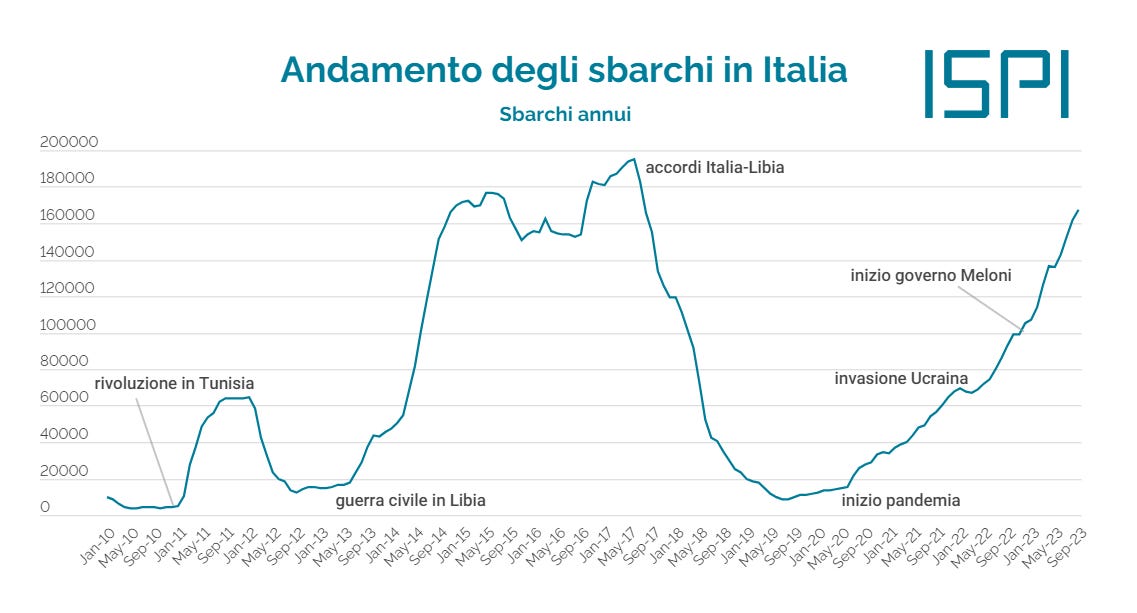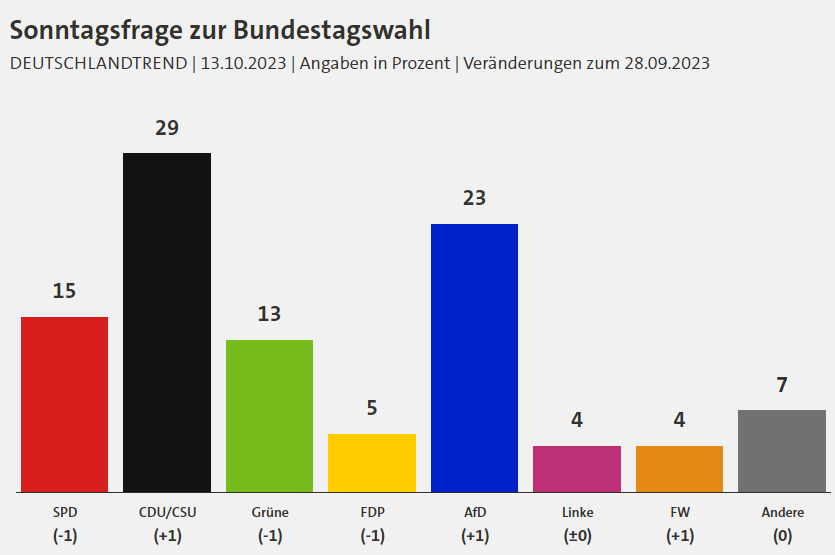The very same Europe that stopped travel over a virus cannot close its borders against the global south, even as the failure to do so threatens the viability of establishment parties and the EU itself

Europe has entered its second great migration crisis since 2014.
Numbers are now at levels not seen since the aftermath of the Libyan civil war in 2014. Here, from the Italian Institute for International Political Studies, is a graph of migrant arrivals in Italy from January 2010 through September 2023:

EU statistics confirm the extreme situation: Before the end of 2023, the EU, Norway, and Switzerland together are projected to receive more than a million asylum applications, and therefore to meet or even exceed the 2016 record of 1.23 million. Germany alone has seen a 74% increase in applications compared to the same period in 2022; only Latvia and Estonia have faced higher pressure, due to migration from Belarus caused by the war in Ukraine. So far, the EU, which is entrusted with the security of European borders, has reacted with tepid half-measures, proposing to fast-track the approval process outside of Europe for those applicants with the least chances of success. This is expected to affect only a minority – perhaps a quarter – of migrants. The rest will enter the Schengen Area as before and live on state entitlements while their applications are processed over months and years.
The examples of Denmark and Hungary show that the migration policies of individual member states can have a dramatic impact on the settlement of migrants domestically. Both countries have taken a hard line against mass migration, and Denmark has seen their asylum applications fall by 56% compared to 2022, while Hungary has processed a mere 26 applications for all of 2023. There is basically no chance that the present German government, dominated by Social Democrats and Greens, will follow their lead any time soon. They are currently negotiating legal adjustments that will allegedly make it slightly easier to deport migrants whose asylum applications have been denied. Nobody believes this will change anything.
The latest polls show that migration is now the most important political issue for 44% of Germans. Despite wall-to-wall climate hysteria from the state media, environmental concerns now take a distant second place, predominating for a mere 18% of voters. The energy crisis of 2022 inaugurated the great German political volte-face, and the migrant crisis seems poised to complete it. Collectively, the ruling parties of the “traffic light” coalition claim the continued loyalty of only 33% of Germans:

The media cannot suppress the migrant problem or talk it away, because the consequences are very immediate and extremely visible at the local level. Every last community has to find housing for the new arrivals. Generally, they’re accommodated at first in school sports halls. In the longer term, migrants receive housing rented by municipal authorities, which is expensive and in extremely short supply.
Reports, like this one from Focus, are all over the press:
In Rosenheim, things are getting worse. The situation is “extremely tense,” according to the district office. Every month about 100 people sent to them, either asylum seekers or refugees from Ukraine. These people are first accommodated in gymnasiums and later distributed.
The district currently rents about 280 properties, but it is “not feasible” to provide housing for 100 new arrivals every month. In addition, the occupation of the gymnasiums with asylum seekers and refugees is “a great burden for school and mass sports.”
District Administrator Otto Lederer (CSU) told FOCUS: “I am very dissatisfied with the asylum and refugee policy of the federal government. For example, the supply of adequate housing alone is a major challenge.” However, “integrating these people” is an even greater task that involves many problems.
Lederer’s clear message: “We are ready to take people in and integrate them, but there are limits, resources, for example, that are only available in limited quantities. Integration that doesn't succeed because the prerequisites are missing is negative for both sides.”
In the meantime, the situation has “also had an impact on our society. Both for the local population, which is partly afraid of being overburdened, and for the refugees, who, when they come to us, can of course expect a certain amount of support,” says Lederer. He sharply rebukes the federal government: “You can't set up additional voluntary reception programmes on the one hand and then leave the municipalities out in the cold when it comes to accommodation and integration.”
That report was from September, but nothing has changed since then. Yesterday, Reinhard Sager, the president of the German Municipal Council, said this in an interview with Tagesspiegel:
There is simply not enough capacity, we have no accommodation and no more staff. We can’t even talk about integration anymore. There are massive problems in the childcare and primary school sectors. Many young people are coming to us who we can’t even begin to integrate. We are sowing problems whose full extent we’ll only see in three, five or ten years. That cannot be wise. What is needed now is an overall policy which assures people that the problem has not only been recognised, but that action will be taken. The states, the coalition government and the CDU/CSU as the largest opposition party must pull together. We can no longer afford, for example, that a single party in the coalition coalition keeps opposing agreements that have already been reached.
That party would be the Greens, who are particularly opposed to migration restrictions and are now seeing their worst poll results since 2018. The party is so larded with open-border lunatics, however, that they simply can’t take any other path:
The fact that the wind has changed in the migration debate has not gone unnoticed by the Greens, but they have not responded to the change in mood. “The fact remains: an upper limit [on migration] is practically impossible to implement, undermines the individual right to asylum and contradicts the Geneva Refugee Convention,” wrote Green Party co-chair Ricarda Lang … Limits will “therefore not happen.”

It is true that upper limits would hardly be enforceable legally. But the Green realist wing around Vice-Chancellor Robert Habeck doubts that the party is striking the right note on the migration issue … In response to concrete proposals to alleviate the migration pressure, the Greens mostly express reservations or say no. They reject extending the definition of safe countries of origin to the states of North Africa, and they are at least sceptical about a switch to benefits in kind [instead of monetary entitlements] for asylum seekers.
Even the cautious changes of the EU asylum reform in the summer went too far for many Greens, who quickly condemned the compromise as amounting to a policy of “isolation and deterrence.” They simply deny that comparatively high German social entitlements constitute a “pull factor,” often claiming that this has not been scientifically proven. …
Losses in the state elections of Bavaria and Hesse apparently did not cause enough suffering to change any minds.
Left-wing Greens in particular emphasise that they have been in worse positions before, since they are in government both federally and in eleven federal states. But it is above all the realists who fear for the political relationships of their party and look to the coming year with queasy feelings.
The European elections are looming in June next year, and afterwards there will be state elections in Thuringia, Saxony and Brandenburg in September. The main issues will be “migration and the economy,” says a Green member of parliament. “If we don't deliver on these issues, who will want to form a coalition with us?”
The answer is the CDU, if one can judge from the statements of their own politicians – even if doing so threatens to destroy the centre-right establishment. It has long been clear that the Greens regard their position in government not as an opportunity to strike compromises and ensure the longer-term viability of their party program, but as a fleeting chance to shove as much of their vision down the throats of Germans as they can until they’re finally voted out. Their leadership maintains the ethos of a radical protest party, and so we have no chance of anything changing until the next national elections in 2025. By then, they will have seeded a wide variety of social, cultural, and economic problems that will continue to bear fruit for decades, even if they are banished forever to the political wilderness.
The political scientist Stefan Luft has given an interview explaining the longer-term political consequences of the migration crisis for Europe as he sees them. If the EU can’t stop the flood, more and more member states will begin a grand competition to worsen conditions for asylum-seekers, incentivizing them to settle elsewhere. States that don’t withdraw entitlements from new arrivals would simply be punished, driving everyone ultimately to reinstate internal border controls and effectively suspending the open travel Europeans have enjoyed since the Schengen Agreement of 1985.
The political visions of allegedly fringe nationalist and Eurosceptic parties are thus on the verge of realization, an inevitable consequence of the internal logic of the open-borders vision itself. Naturally, this will happen only after European countries have imported millions more poor, uneducated foreigners than they can ever realistically manage or integrate. In the meantime, there will be a scramble to undo the Merkel-era branding of migration opponents as right-wing xenophobes, not because this was always stupid, but because the future of the establishment left is at stake. Even solid majorities of Germany the Greens and the SPD demand tighter border controls. As the Danish Social Democrats have realized, pro-migration policies alienate the working class most of all, leaving the left with no voters beyond well-off, oblivious, environmentally obsessed urbanites, who exercise an outsized influence on media and academic discourse but don’t amount to more than 10% of voters.